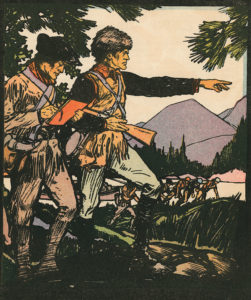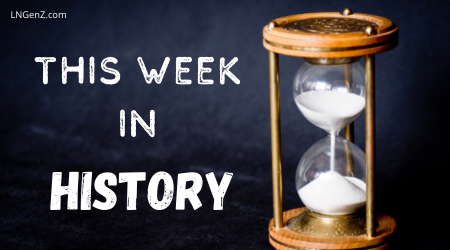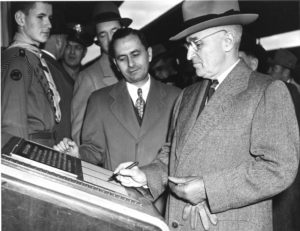-
January
-
February
- This Week in History: February 6-12 – Lesson
- This Week in History: February 6-12 – Quiz
- This Week in History: February 13-19 – Lesson
- This Week in History: February 13-19 – Quiz
- This Week in History: February 20-26 – Lesson
- This Week in History: February 20-26 – Quiz
- This Week in History: February 27-March 5 – Lesson
- This Week in History: February 27-March 5 – Quiz
-
March
- This Week in History: March 6-12 – Lesson
- This Week in History: March 6-12 – Quiz
- This Week in History: March 13-19 – Lesson
- This Week in History: March 13-19 – Quiz
- This Week in History: March 20-26 – Lesson
- This Week in History: March 20-26 – Quiz
- This Week in History: March 27-April 2 – Lesson
- This Week in History: March 27-April 2 – Quiz
-
April
- This Week in History April 3-9 – Lesson
- This Week in History April 3-9 – Quiz
- This Week in History: April 10-16 – Lesson
- This Week in History: April 10-16 – Quiz
- This Week in History: April 17-23 – Lesson
- This Week in History: April 17-23 – Quiz
- This Week in History: April 24-30 – Lesson
- This Week in History: April 24-30 – Quiz
-
May
- This Week in History: May 1 – 7 – Lesson
- This Week in History: May 1 – 7 – Quiz
- This Week in History: May 8 – 14 – Lesson
- This Week in History: May 8 – 14 – Quiz
- This Week in History: May 15 – 21 – Lesson
- This Week in History: May 15 – 21 – Quiz
- This Week in History: May 22-28 – Lesson
- This Week in History: May 22-28 – Quiz
- This Week in History: May 29-June 4 – Lesson
- This Week in History: May 29-June 4 – Quiz
-
June
- This Week in History: June 5 – 11 – Lesson
- This Week in History: June 5 – 11 – Quiz
- This Week in History: June 12-18 – Lesson
- This Week in History: June 12-18 – Quiz
- This Week in History: June 19-25 – Lesson
- This Week in History: June 19-25 – Quiz
- This Week in History: June 26 – July 2 – Lesson
- This Week in History: June 26 – July 2 – Quiz
-
July
- This Week in History: July 3 – 9 – Lesson
- This Week in History: July 3 – 9 – Quiz
- This Week in History: July 10 – 16 – Lesson
- This Week in History: July 10 – 16 – Quiz
- This Week in History July 17 – 23 – Lesson
- This Week in History July 17 – 23 – Quiz
- This Week in History – July 24-30 – Lesson
- This Week in History – July 24-30 – Quiz
- This Week in History: July 31 – August 6 – Lesson
- This Week in History: July 31 – August 6 – Quiz
-
August
- This Week in History: August 7-13 – Lesson
- This Week in History: August 7-13 – Quiz
- This Week in History: August 14 – 20 – Lesson
- This Week in History: August 14 – 20 – Quiz
- This Week in History: August 21 – 27 – Lesson
- This Week in History: August 21 – 27 – Quiz
- This Week in History: August 28 – September 3 – Lesson
- This Week in History: August 28 – September 3 – Quiz
-
September
- This Week in History: September 4 – 10 – Lesson
- This Week in History: September 4 – 10 – Quiz
- This Week in History: September 11 -17 – Lesson
- This Week in History: September 11 -17 – Quiz
- This Week in History: September 18 – 24 – Lesson
- This Week in History: September 18 – 24 – Quiz
- This Week in History: September 25 – October 1 – Lesson
- This Week in History: September 25 – October 1 – Quiz
-
October
- This Week in History: October 2-8 – Lesson
- This Week in History: October 2-8 – Quiz
- This Week in History: October 9 –15 – Lesson
- This Week in History: October 9 –15 – Quiz
- This Week in History: October 16–22 – Lesson
- This Week in History: October 16–22 – Quiz
- This Week in History: October 23–29 – Lesson
- This Week in History: October 23 –29 – Quiz
- This Week in History: October 30 – November 5 – Lesson
- This Week in History: October 30 – November 5 – Quiz
-
November
- This Week in History: November 6 – 12 – Lesson
- This Week in History: November 6 – 12 – Quiz
- This Week in History: November 13 – 19 – Lesson
- This Week in History: November 13 – 19 – Quiz
- This Week in History: November 20 – 26 – Lesson
- This Week in History: November 20 – 26 – Quiz
- This Week in History: November 27- December 3 – Lesson
- This Week in History: November 27- December 3 – Quiz
-
December
This Week in History: May 8 – 14 – Lesson

Lewis and Clark 1931. Woodcut. (Photo by GraphicaArtis/Getty Images)
“Few will have the greatness to bend history itself; but each of us can work to change a small portion of events, and in the total of all those acts will be written the history of this generation.” ~Robert Kennedy
May 14, 1607: Jamestown Settlement Established
On May 14, 1607, Jamestown was established in the New World, but it was a long and rough road to get there.
In 1606, King James I set the Virginia Company to make a settlement in North America. At the time, the entire eastern coast north of Florida was called Virginia. The idea was to search for gold and silver in the New World and establish a settlement. Also, they hoped to find a river route to the Pacific Ocean and set up a trade route with the Orient, a term that refers to the lands far to the east of Europe, like India and China.
In December 1606, about 100 people left England on three ships: Susan Constant, Godspeed, and Discovery. It took until April to reach the Chesapeake Bay. A governing council, which included Captain John Smith and the commander of the voyage, Christopher Newport, the group looked for a good place to establish a settlement. On May 13, 1607, the crew landed on a peninsula in the James River and decided that would make a good place to begin.
Before becoming Jamestown, the settlement had other names such as James Forte, James Towne, and James Cittie. At first, it was constructed in a triangle shape with its wooden buildings surrounding the storehouse that held weapons and other supplies. There was also a church and some homes.
In the summer, two of the ships returned to England to give a report to the king as well as get more supplies and people. While they were gone, the colonists suffered from hunger and disease. They were also being attacked by the Algonquian tribes under Chief Powhatan – Pocahontas’s father. It wasn’t until 1610, when new settlers and supplies arrived, that the settlement was finally able to start thriving.
May 14, 1804: Lewis and Clark Expedition
Throughout early US history, parts of the New World changed hands a number of times as countries fought to control areas. In 1802, Spain’s King Charles IV returned the Louisiana Territory to France, but at the same time, took away America’s port access. Then, in 1803, President Thomas Jefferson and James Monroe worked out a deal to purchase the Louisiana Territory from France. The land was massive, about 827,000 square miles. This meant someone needed to go out and explore so that we knew what we had.
On this day, Jefferson tasked his friend Meriwether Lewis with the job of exploring the territory. Lewis chose William Clark to be his co-leader, and the two began a two-year expedition, during which they covered about 8,000 miles.
Read more about the Lewis and Clark Expedition here.
Other Notable Mentions
 May 8, 1942: The Battle of the Coral Sea began during World War II. Fought off New Guinea, it was the first time in history where two opposing naval forces fought using aircraft and never saw the opponent’s ship. This is also where Japan suffered its first defeat during the war.
May 8, 1942: The Battle of the Coral Sea began during World War II. Fought off New Guinea, it was the first time in history where two opposing naval forces fought using aircraft and never saw the opponent’s ship. This is also where Japan suffered its first defeat during the war.
May 9, 1862: General David Hunter, Union commander, issued orders to free slaves in Florida, Georgia, and South Carolina during the Civil War, even though he didn’t have presidential approval yet.
May 10, 1869: The Union Pacific and the Central Pacific railways were first linked at Promontory Point, Utah.
May 10, 1994: Nelson Mandela was inaugurated as president of South Africa. A former political prisoner, he won the first free election in the country.
May 11, 1862: Confederate forces destroyed their own Ironclad Merrimac to keep it from being captured by Union troops during the Civil War.
May 11, 1969: The Battle of “Hamburger Hill” began during the Vietnam War. For ten days, American troops repeatedly scaled the hill, trying to take Dong Ap Bia Mountain, but in the end gave up.
May 12, 1937: George VI was crowned at Westminster Abbey in London. His daughter is Queen Elizabeth.
May 12, 1949: Soviet Russia lifted its blockade of Berlin.
May 13, 1846: President James K. Polk declared war on Mexico. The war ended with the Treaty of Guadalupe Hidalgo in 1848.
May 13, 1943: Germans and Italians surrendered during the Tunis campaign in World War II. Winston Churchill was given credit for the victory.
May 13, 1981: Pope John Paull II was shot twice by an escaped terrorist. After the Pope recovered, he held a meeting with his shooter and then publicly forgave him.
May 14, 1796: Dr. Edward Jenner developed the Smallpox vaccine. Within 18 months, 12,000 people had been vaccinated in England.
May 14, 1942: Congress allowed women to enlist for noncombat duties during World War II.
Famous Birthdays

President Harry S. Truman (Photo by: HUM Images/Universal Images Group via Getty Images)
Henri Dunant (May 8, 1828) was born in Geneva, Switzerland. He was a Nobel Prize winner, founder of the International Red Cross and the YMCA.
Harry S. Truman (May 8, 1884) was born in Lamar, Missouri. He was the 33rd president of the US, taking the office after the death of Franklin D. Roosevelt in 1945.
Irving Berlin (May 11, 1888) was born in Tyumen, Russia as Israel Isidore Baline. He was a songwriter known for such hits as God Bless America, White Christmas, There’s No Business Like Show Business, and Puttin’ on the Ritz.
Florence Nightingale (May 12, 1820) was born in Florence, Italy. A British nurse and health activist, she volunteered in Turkey where she made improvements in sanitary practices and reduced death rates.
Gabriel Fahrenheit (May 14, 1686) was born in Danzig, Germany. He began using mercury in thermometers which improved their accuracy.
Thomas Gainsborough (May 14, 1727) was born in Sudbury, Suffolk, England. As a landscape and portrait painter, he is most known for works such as The Blue Boy, The Market Cart, and The Watering Place.